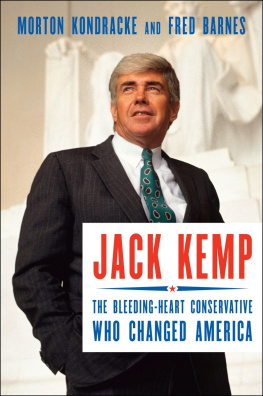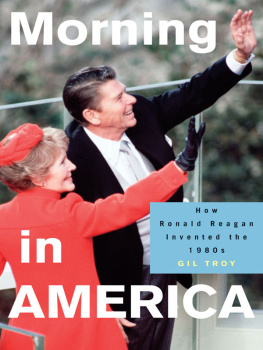Morton Kondracke - Jack Kemp: The Bleeding-Heart Conservative Who Changed America
Here you can read online Morton Kondracke - Jack Kemp: The Bleeding-Heart Conservative Who Changed America full text of the book (entire story) in english for free. Download pdf and epub, get meaning, cover and reviews about this ebook. year: 2015, publisher: Penguin Publishing Group, genre: Politics. Description of the work, (preface) as well as reviews are available. Best literature library LitArk.com created for fans of good reading and offers a wide selection of genres:
Romance novel
Science fiction
Adventure
Detective
Science
History
Home and family
Prose
Art
Politics
Computer
Non-fiction
Religion
Business
Children
Humor
Choose a favorite category and find really read worthwhile books. Enjoy immersion in the world of imagination, feel the emotions of the characters or learn something new for yourself, make an fascinating discovery.
- Book:Jack Kemp: The Bleeding-Heart Conservative Who Changed America
- Author:
- Publisher:Penguin Publishing Group
- Genre:
- Year:2015
- Rating:4 / 5
- Favourites:Add to favourites
- Your mark:
Jack Kemp: The Bleeding-Heart Conservative Who Changed America: summary, description and annotation
We offer to read an annotation, description, summary or preface (depends on what the author of the book "Jack Kemp: The Bleeding-Heart Conservative Who Changed America" wrote himself). If you haven't found the necessary information about the book — write in the comments, we will try to find it.
The late 1970s were miserable for America. It was the postVietnam, postWatergate era, a time of high unemployment, ruinous inflation, gasoline lines, Communist advances, and bottomed-out U.S. morale. In the 1980s, it all turned around: stagflation ended and nearly two decades of prosperity ensued. The Soviet Union retreated, then collapsed. America again believed in itself. And around the world, democratic capitalism was deemed the end of history.
Ronald Reagans policies sparked the American renaissance, but the Gippers leadership is only part of the story. The economic theory that underpinned Americas success was pioneered by a star professional quarterback turned self-taught intellectual and bleeding-heart conservative: Jack Kemp.
Kemps role in a pivotal period in American history is at last illuminated in this first-ever biography, which also has lessons for the politics of today. Kemp was the congressional champion of supply-side economicsthe idea that lowering taxes would foster growth. Even today, almost no one advocates a return to a top income tax rate of 70 percent.
Kemp didnt just challenge the Democratic establishment. He also encouraged his fellow Republicans to be growth (not austerity) minded, open their tent to minorities and blue-collar workers, battle poverty and discrimination, and once again become the party of Lincoln.
Kemp approached politics the same way he played quarterback for the Buffalo Bills: with a refusal to accept defeat. Yet he also was incapable of personal attack, arguing always on the level of ideas. He regarded opponents as adversaries, not enemies, and often cooperated with them to get things done. Despite many ups and downs, including failed presidential and vice-presidential bids, he represented a positive, idealistic, compassionate Republicanism.
Drawing on never-published papers and more than one hundred Kemp Oral History Project interviews, noted journalists Morton Kondracke and Fred Barnes trace Kemps life, from his childhood through his pro football career to his influential years as a congressman and cabinet secretary.
As the American Dream seems to be waning and polarized politics stifles Washington, Kemp is a model for what politics ought to be. The Republican party and the nation are in desperate need of another Kemp.
Morton Kondracke: author's other books
Who wrote Jack Kemp: The Bleeding-Heart Conservative Who Changed America? Find out the surname, the name of the author of the book and a list of all author's works by series.










